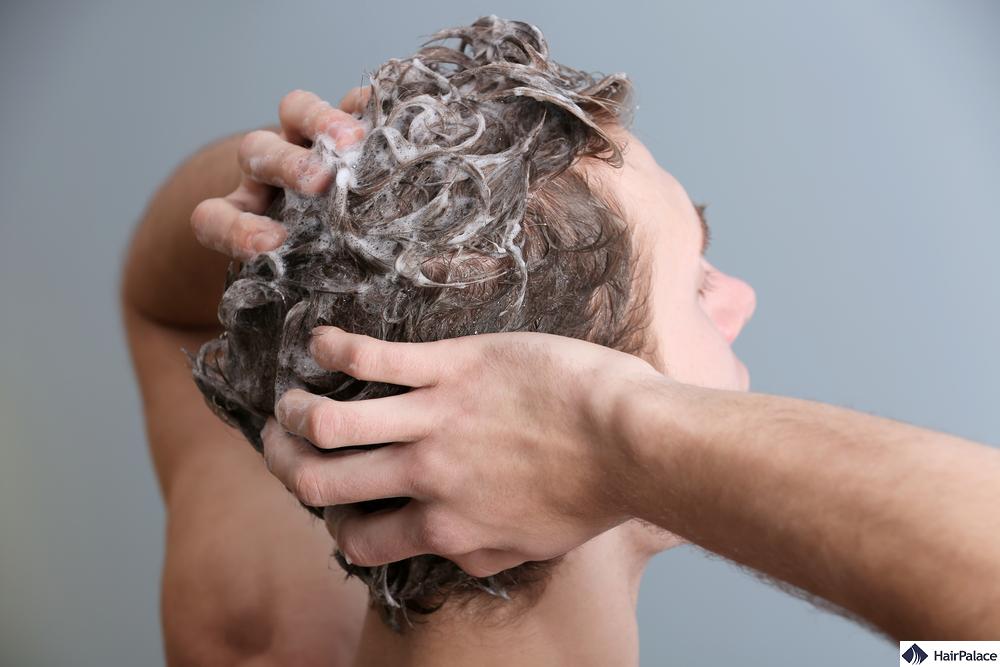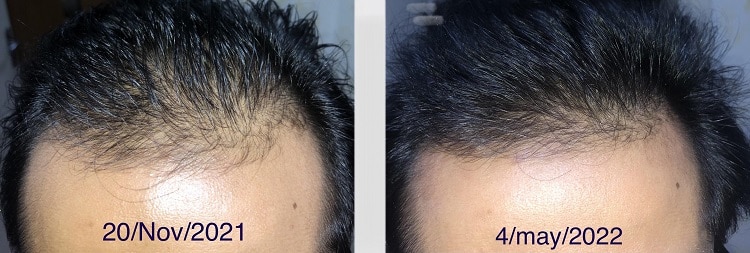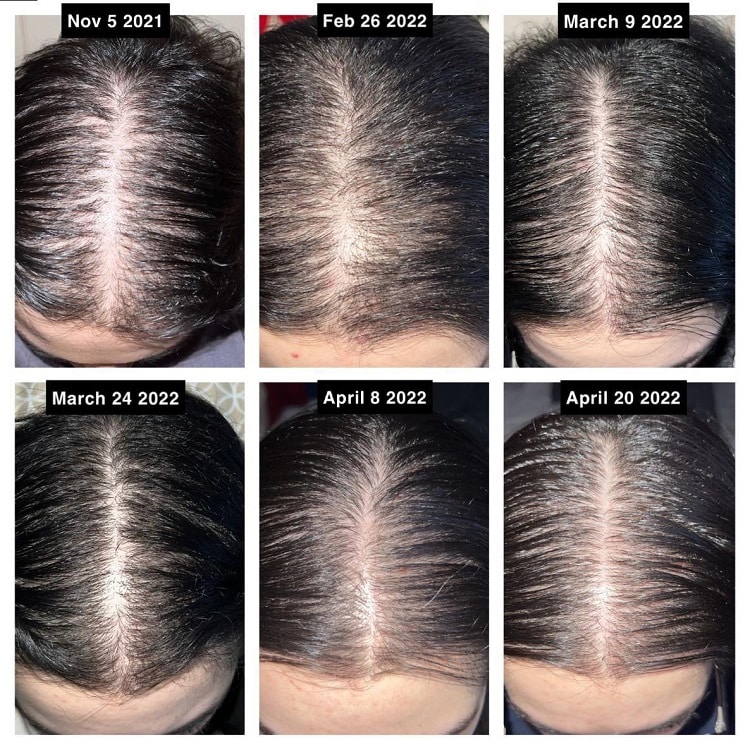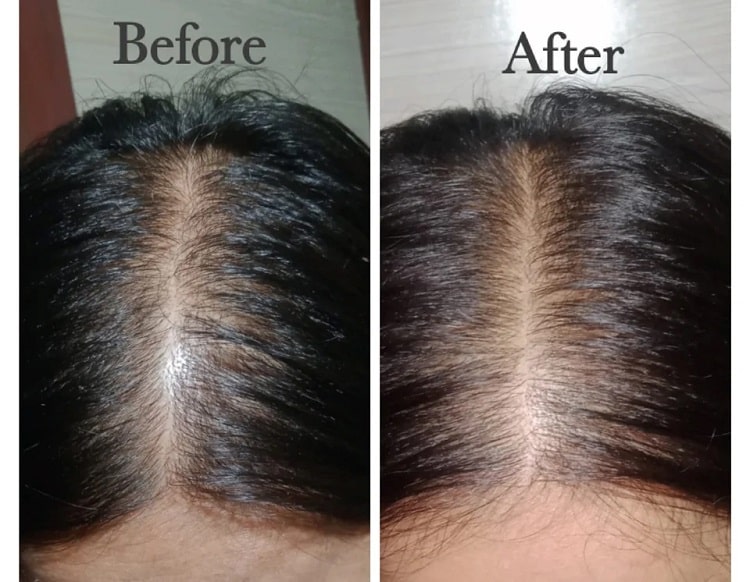Rosemary Oil for Hair Growth: Benefits, Side Effects, Uses

Rosemary oil promotes hair growth by stimulating blood circulation to the scalp and preventing hair follicle damage.
It strengthens hair, reduces dandruff, and can improve overall scalp health.
Using rosemary oil products may lead to thicker and stronger hair and with continuous use you can prevent hair transplantation.
Today, we’ll explore everything you need to know about using diluted rosemary oil products for hair growth.
We’ll explore all of its active ingredients and what effects these may have on your ailing hair.
Together, we’ll see if this essential oil is the right choice for you.
- Active ingredients
- Benefits
- Results
- How to use
- How to make your own hair solution
- Safety & Precautions
What are the active ingredients in rosemary oil?
Active ingredients are what make a haircare product truly shine. Think of them as their secret weapon.
So what are the active ingredients of rosemary oil, and what do they influence?
- Glycolic acid helps protect hair and make it softer
- Flavonoids, which stimulate hair growth
- Tannins, which are especially effective at supporting colour-treated hair
- Saponins, which have anti-inflammatory properties
- Bitter substances, which have antioxidant and antimicrobial properties
Additionally, rosemary oil may contain other essential oils, including camphor, carnosol, cineol, terpineol, or borneol, increasing the rosemary oil’s effectiveness in areas like blood circulation and reducing inflammation.
Benefits of rosemary oil
Let’s take a closer look at the many areas and hair loss conditions that rosemary essential oil can help treat:
1. Promotes hair growth
Some studies have shown that the oil can benefit hair growth in the same way as the popular medication minoxidil (Rogaine).
This is because of the oil’s natural anti-inflammatory properties, a key reason it’s used to treat conditions like alopecia areata.
That said, more research is needed to conclusively show how effective it is for regrowth.
2. Soothes the scalp
One of the oil’s active ingredients, carnosic acid, can help heal tissue and rejuvenate nerves in the scalp, thus soothing the skin and preventing scalp irritation.

3. Improves blood supply
As a vasodilator, rosemary oil for thinning hair dilates blood vessels, improving blood flow around the scalp.
This allows more nutrients and oxygen to reach and nourish hair strands, resulting in healthier hair.
4. Strengthens hair
The oil can protect your hair and prevent early breakage with continued use.
This can prevent earlier hair loss, making strands appear thicker and denser, and have improved elasticity.
5. Fights dandruff
With its anti-bacterial and anti-fungal properties, using rosemary can also improve your scalp’s overall health.
It drastically reduces the presence of dandruff and other harmful agents that can clog hair follicles.
6. Prevents hair loss
Prevention is the best defense.
And because rosemary oil helps prevent many harmful things like inflammation and dandruff, many people deem it a preventative to early hair shedding and hair loss.
7. Other benefits of rosemary oil
There are other holistic benefits to using rosemary, including:
- Concentration: this oil helps prevent the breakdown of a chemical known as acetylcholine, which is responsible for memory, learning, and attention.
- Mood: Some studies have seen that diluted forms of rosemary oil boosted participants’ mood, energy levels, and alertness within just one hour.
Rosemary oil for hair growth before and after
Many studies have shown that rosemary oil can stimulate hair growth.
That said, everyone is unique and may respond differently to the treatment.
Some people may enjoy huge results – others, unfortunately, may not.
Furthermore, you might experience results quicker or slower than others.
It may take up to six months for you to see any changes in your hair as a result.
How to use rosemary oil for hair
Want to get the most out of your rosemary oil hair products?
Below are some tips and tricks on how to use rosemary oil on hair to achieve ideal results.
1. Gently massage it into your scalp
Start using rosemary oil once or twice a week to see how your body initially reacts to it.
Simply add a few drops of the oil with a teaspoon of carrier oil., like jojoba oil.
This helps dilute the concentration and minimize potential side effects.
Apply to your scalp and massage gently.
You can rinse it out any time, but we recommend waiting at least 10 minutes to allow the oil to reach its destination.
2. Mix it into your shampoo
As well as a carrier oil, some people like to mix rosemary oil with a range of haircare products, like shampoos, to both dilute it and add it easily into their standard haircare regime.
The benefit of this is that your hair may be able to process and absorb the oil more easily.
Be careful not to overdo adding too much rosemary oil, as adding high concentrations can still irritate the skin and cause discomfort, despite the added shampoo.
If in doubt, just add five drops to be on the safe side. After mixing, simply apply and rinse your shampoo as you normally would.

3. Create your own homemade shampoo
You may also want to develop your specialized shampoo that allows rosemary oil to shine.
Several recipes online use a mixture of baking soda and other oils like coconut oil for a highly diverse, effective shampoo that can encourage hair growth.
A good example of this in action is the popular Mielle Rosemary Mint Scalp Oil, which uses up to 30 essential oils to infuse hair with all the nutrients, strength, and support it needs to grow.
4. Additional ways to use rosemary oil
Natural rosemary oil is versatile and can be used in various ways for a complete and holistic treatment. These include:
- Diffuse: Add eight to ten drops of rosemary oil into your diffuser and breathe in its rich, calming aroma.
- Inhale: Sometimes, you might want to inhale the rosemary oil from the bottle or sprinkle a tiny amount on a cloth or tissue to smell. This can have a calm, settling effect on you.
- Bathe: Set up a warm bath and gently add four to six drops of rosemary oil. This can help support your entire body, as spending at least ten minutes with the bath water can nourish and soothe you.
How to make rosemary water for hair by yourself
Try this quick homemade rosemary water for hair recipe to enhance your hair growth.
How often should you use rosemary oil on your hair?
Initially, you should only use rosemary oil once or twice a week until you know how your skin and hair react to it.
Once you are confident that you respond well to rosemary oil, you can use it daily as part of your haircare routine.
But even with daily use, we strongly recommend you continue diluting the oil with a carrier to help support hair while protecting it from adverse side effects.
How long to leave Rosemary oil in hair
Rosemary oil can typically be left in the hair for about 30 minutes to 2 hours before rinsing it out with a mild shampoo.
Make sure to always dilute rosemary oil with a carrier oil to prevent irritation to your scalp.
Who should use rosemary oil?

Rosemary oil is suitable for virtually everyone who suffers from thinning hair and wants to support and encourage hair growth.
It is a versatile oil that can benefit various hair types, as it targets the hair follicle and not the hair strand.
What’s more, you can use these products on colour-treated hair without compromising the look and tone of the hair.
That said, like any essential oil, rosemary oil can cause an itchy scalp to develop or irritate sensitive skin.
Conduct a small patch test on your skin, and wait 24 hours to see how well your skin reacts.
If you are prone to this with other products, you may want to consult with a board-certified dermatologist or doctor for tailored advice on recommended products.
Specialists may also recommend lavender oil for hair or pumpkin seed oil hair growth products, as their benefits are similar to those of rosemary oil.
Additionally, if you’re pregnant or breastfeeding, you may want to avoid essential oils, as little research has been conducted to examine their effects.
Safety and precautions
As with any essential oil, you must consider some safety measures to protect yourself.
We strongly recommend you conduct a patch test to see how sensitive your skin may be to the oil.
Avoid using too much concentrated oil to limit or prevent potential irritation. Instead, dilute it by mixing with a carrier oil like rosehip or jojoba oil, or blend it with other haircare products.
Avoid getting products in your eyes, too. If this does happen, rinse out immediately with cold water.
Finally, we still aren’t sure about rosemary oil’s long-term effects on health and well-being.
A lack of peer-reviewed studies means we cannot say for certain the effects these oils may have on a pregnant woman or someone currently breastfeeding.
You may wish to consult with your doctor and remain cautious when using essential oils.
Conclusion
So is rosemary oil good for your hair?
Well, there is strong evidence, both scientifically and anecdotally, that the best hair oils for hair loss can help promote hair growth and prevent further loss.
Rosemary oil be an effective support for many hair types, too, and for a variety of conditions, including male and female pattern baldness, as well as alopecia, too.
What’s more, some studies have compared it favourably to other popular medications like minoxidil, proving that this oil can be well worth investing in.
And like any other essential oil, when used correctly, it can yield other benefits to your daily life, including boosting your memory, concentration, and mood.
Rosemary Oil for Hair Growth FAQ
Rosemary oil can stimulate hair growth, improve scalp circulation, and help reduce dandruff.
Rosemary oil is not known to cause hair loss. In fact, some studies suggest it might promote hair growth and reduce hair loss.
Some studies suggest rosemary oil may promote hair growth and thickness, making it a potential natural alternative for hair thinning concerns.
Results can vary, but consistent use of rosemary oil for at least 6 months is recommended to observe hair growth benefits.
It’s ill-advised to leave rosemary oil in your hair for longer than 2 hours. Doing so may achieve the opposite effects of what you’re hoping for and lead to scalp irritation as well as hair damage.
Rosemary oil is beneficial for hair as it may promote hair growth, improve circulation to the scalp, and help reduce dandruff.
Some research suggests that it may help with hair regrowth and potentially reinforce hair shafts against further damage.
Other than rosemary oil, olive oil is a great choice for hair loss, as it nourishes the scalp, reduces dandruff, and strengthens hair. Additionally, you can try apple cider vinegar, which promotes hair growth, or peppermint oil, known to improve blood circulation to hair follicles.
Last medically reviewed on December 12th, 2024
- Ezekwe N, King M, Hollinger JC. The use of natural ingredients in the treatment of alopecias with an emphasis on central centrifugal cicatricial alopecia: a systematic review. J Clin Aesthet Dermatol. 2020;13(8):23-27.https://pubmed.ncbi.nlm.nih.gov/33178378/
- Panahi Y, Taghizadeh M, Marzony ET, Sahebkar A. Rosemary oil vs minoxidil 2% for the treatment of androgenetic alopecia: a randomized comparative trial. Skinmed. 2015;13(1):15-21.https://pubmed.ncbi.nlm.nih.gov/25842469/
- Murata K, et al. (2013). Promotion of hair growth by Rosmarinus officinalis leaf extract.https://pubmed.ncbi.nlm.nih.gov/22517595/





